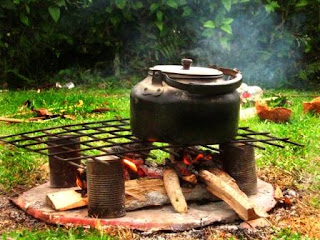Be specific, my college writing professor would tell me.
Those are not “trees” you are writing about, those are “aspens” or “wilted maples” or “the old oak giant that stood in front of Gerald’s dairy barn.”
 |
| Here we go! |
“Humph,” I thought to myself, glancing at the tangle of unknown trees, bushes, ferns, shrubs, and leaves towering above, underneath, and around me in a web so thick that I think I’ll start breathing the color green. Ferns more than twice my height scrape against mammoth pillars of vines, dripping down the trunks of the host trees, hundreds of feet tall. Beneath the umbrella of banana leaves, cicadas hum cheerfully, until the whole forest seems to vibrate. Coconut palms skyrocket to the heavens, and for a moment I understand why the canopy of the rainforest could just as well be Mars when compared to the forest floor. Good luck at picking out specifics in that voluminous mass.
I dug my toes into the ridge of hard, red-packed clay, and leaned forward, calf muscles tense. The path crawled upwards so steeply that my hands brushed the hillside, snagging on roots for stability. We were on our weekly hike, a single file of hats scrambling across the mountains near Nobnob and the POC centre.
One of the POC workmen tromped ahead of us, casually swinging his bush knife and calling out interesting tidbits for the gasping line of students behind him. “Over there is Tisa Matthew’s house.”
I teeter on the hillside, peering across the valley. I don't see any house. I see green.
“Where?” another student shouted from down the line.
He pointed with his bush knife. “There.” And I crane my neck… until a speck of a woven bamboo, a brown smudge, poked out from between the trees.
“He walks to POC from
here?”
The corners of my guide’s mouth twitched upward, and he didn’t answer, instead turning to start us back up the mountain. Laughter and a few pebbles—is it children?—sparked from the bushes several meters above us, but I could see no one.
Occasionally we encounter another group of students on a hike (we’re sent out with careful calculations to prevent collisions, not unlike those word problems in school:
If Hikers A start walking west at 4 km per hour and Hikers B are walking east at…) and shout friendly hellos and warnings about the path ahead.
It’s pretty steep! we holler…never asking if it’s up or down. It’s both.
Travel in Papua New Guinea is like a sine wave, where the only moments of flat are most likely because the path is a meter or less wide, hacked into the side of the mountain with a drop-off and view on the other side that is breath-taking in all senses of the word. “Only a little bit further!” we pass the message down the line. “only two more hills!” Muscles ache, and we focus on breathing. Don’t stop on the hill—you won’t be able to start again. A hand reaches down, steadies the next person in line. “Careful there! It’s slippery.”
 Malolo
Malolo is a treasured word. Rest. Our heartbeats begin to cease their
kundu drum practice as we pull waterbottles from our backpacks, like tropical camels (except these are slightly flavored with stainless-steel and leaves). Some of the women begin to pull seeds from their skirts. I make a cursory wipe across my forehead, but it’s not much use. My clothes are already soaked; I’ll be able to ring them out by the time I get back. But here, there’s a breeze.
Plastic rattles, and someone breaks a beef cracker, distributes it like Sunday’s communion. We stand together, breathing. The wind is spiced with sweat, tree rot, heavy bundles of fruit—still unknown— but precarious above our heads, and a violet spiky-petaled flower at my feet. Down in the heel of the valley we were like ants, peering upwards between the cracks of leaves at the sky, but up here? Here, ridge upon ridge of mountains crest and fall like the Pacific Ocean at our backs, until they fade and grey into the distance, mixing with the clouds, and I no longer know which belongs to earth or heaven.
Malolo.
Yet I will exult in Yahweh, I will rejoice in the God of my salvation.
The Lord God is my strength, and
He has made my feet like hinds’ feet and
makes me walk on my high places.
Habakkuk 3:18-19

















